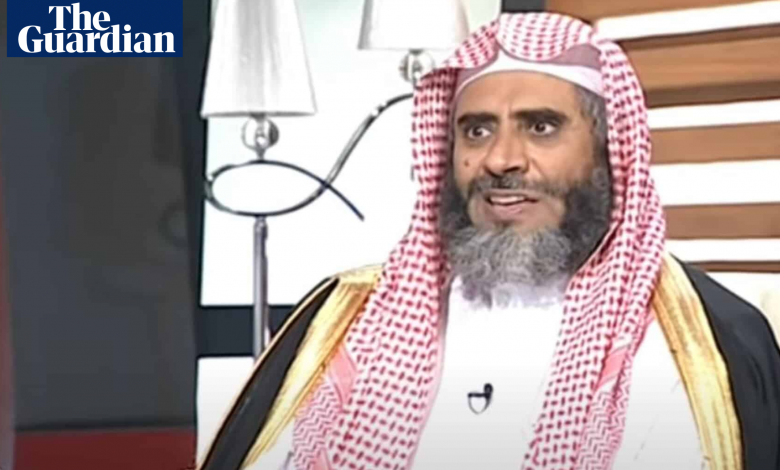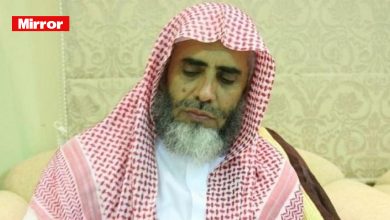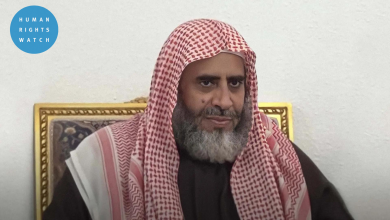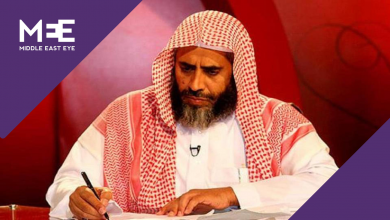The Guardian: Saudi prosecutors seek death penalty for academic over social media use

The Guardian: Court documents reveal reasons for Awad Al-Qarni’s arrest – even though rulers are major investors in social media platforms
A prominent pro-reform law professor in Saudi Arabia is facing the death penalty for alleged crimes including having a Twitter account and using WhatsApp to share news considered “hostile” to the kingdom, according to court documents seen by the Guardian.
The arrest of Awad Al-Qarni, 65, in September 2017 represented the start of a crackdown against dissent by the then newly named crown prince, Mohammed bin Salman.
Details of the charges brought against Al-Qarni have now been shared with the Guardian by his son Nasser, who last year fled the kingdom and is living in the UK, where he has said he is seeking asylum protection. Public prosecutors have called for the death penalty in the case, but the court has yet to make a formal judgement.
Al-Qarni has been portrayed in Saudi-controlled media as a dangerous preacher, but dissidents have said Al-Qarni was an important and well-regarded intellectual with a strong social media following, including 2m Twitter followers.
Human rights advocates and Saudi dissidents living in exile have warned that authorities in the kingdom are engaged in a new and severe crackdown on individuals who are perceived to be critics of the Saudi government. Last year, Salma al-Shehab, a Leeds PhD student and mother of two, received a 34-year sentence for having a Twitter account and for following and retweeting dissidents and activists. Another woman, Noura al-Qahtani, was sentenced to 45 years in prison for using Twitter.
But the prosecution documents shared by Nasser Al-Qarni show that the use of social media and other communications has been criminalised inside the kingdom since the beginning of Prince Mohammed’s reign.
The Saudi government and state-controlled investors have recently increased their financial stake in US social media platforms, including Twitter and Facebook, and entertainment companies such as Disney. Prince Alwaleed bin Talal, a Saudi investor, is the second-largest investor in Twitter after Elon Musk’s takeover of the social media platform. The investor was himself detained for 83 days during a so-called anti-corruption purge in 2017. Prince Alwaleed has acknowledged that he was released after he had reached an “understanding” with the kingdom that was “confidential and secret between me and the government”.
Saudi Arabia’s sovereign wealth fund, the Public Investment Fund, has separately increased its stake in Facebook and Meta, the company that owns Facebook and WhatsApp.
A translation of the charges against Al-Qarni include the law professor’s “admission” that he used a social media account under his own name (@awadalqarni) and used it “at every opportunity … to express his opinions”. The documents also state that he “admitted” participating in a WhatsApp chat, and was accused of participating in videos in which he praised the Muslim Brotherhood. Al-Qarni’s apparent use of Telegram, and creation of a Telegram account, was also included in allegations.
Jeed Basyouni, the head of Middle East and north African advocacy at Reprieve, the human rights group, said Al-Qarni’s case fits into a trend the group has observed of scholars and academics facing the death penalty for tweeting and expressing their views.
Asked about the kingdom’s investment in Facebook and Twitter, Basyouni said: “If it wasn’t so sinister, it would be farcical. It is consistent with how they’re operating under this crown prince.”
The kingdom has been seeking to project an image internationally of investing in technology, modern infrastructure, sport and entertainment, Basyouni said.
“But at the same time, that is fully irreconcilable with all the cases we are seeing, where we are talking about the public prosecutor – under the guidance of Mohammed bin Salman – calling for people to be killed for their opinions, for tweets, for conversations. They are not dangerous, they’re not calling for an overthrow of the regime,” she said.
In the US, companies with large Saudi investments or other business in Saudi have not responded to public questions about Saudi’s treatment of dissent or the imprisonment of its users. Nor has the kingdom bowed to calls from the Biden administration to improve its human rights record.
Ahmed Almutairi (also known as Ahmed Aljbreen), a Saudi who was charged with failing to register as a foreign agent when he allegedly took part in a 2014-15 conspiracy to infiltrate Twitter on behalf of the Saudi government and steal confidential user data, is considered a fugitive by the FBI after he evaded arrest in the US. The breach is believed to have led to the outing of at least one Twitter user, Abdulrahman al-Sadhan, who allegedly used a satirical account to mock the government. He was arrested and disappeared, and later sentenced to decades in prison.
Far from keeping a low profile, Almutairi’s social media accounts show him leading an active life in Riyadh, including posting an invitation and VIP pass on his Snapchat this week to a party sponsored by Netflix at Riyadh’s International Park, which was hosted by the Saudi General Entertainment Authority.
The Netflix spokesperson Richard Siklos did not respond to requests for comment about the company sponsoring an event in Riyadh whose invitation list included a man wanted by the FBI. The Netflix CEO Reed Hastings acknowledged in 2020 that it agreed to censor an episode of comedy show Patriot Act with Hasan Minhaj, which included criticism of Saudi Arabia for the murder of journalist Jamal Khashoggi, in exchange for Saudi allowing explicit content to be shown in the kingdom.
“It is beyond abhorrent that a prominent law professor faces the death penalty for using Twitter while an FBI fugitive, wanted for infiltrating Twitter’s headquarters, receives a Netflix-sponsored VIP invitation to attend a Saudi government event,” said Khalid Aljabri, who lives in exile and whose father was a former Saudi intelligence officer, and whose brother and sister are being held in the kingdom.
Saudi dissidents living in the US also became aware this week that Ibrahim Alhussayen – a Saudi who had been living in the US and pleaded guilty to lying to authorities after prosectors alleged he harassed and threatened individuals living in the US and Canada – was deported back to Saudi after serving a short sentence.
One of Alhussayen’s victims posted this week that an account belonging to the harasser sought to contact her after he was released from prison. The DOJ did not respond to a request for comment.
The Saudi government did not respond to requests for comment.
This story was amended on 15 January 2023 to clarify that the court has not yet made its final judgement, and on 16 January 2023 to remove a reference to Richard Siklos, who is no longer a spokesperson for Netflix as initially described.


